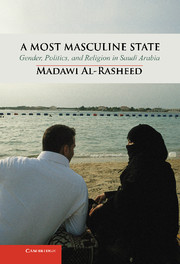Book contents
- Frontmatter
- Contents
- Acknowledgments
- Introduction
- 1 From Religious Revival to Religious Nationalism
- 2 Schooling Women
- 3 Symbols of Piety
- 4 The Quest for Cosmopolitan Modernity
- 5 Women in Search of Themselves
- 6 Celebrity Women Novelists and the Cosmopolitan Fantasy
- 7 Guarding Self and Nation
- Conclusion
- Glossary
- Bibliography
- Index
- References
7 - Guarding Self and Nation
Women Preachers and Activists
Published online by Cambridge University Press: 05 February 2013
- Frontmatter
- Contents
- Acknowledgments
- Introduction
- 1 From Religious Revival to Religious Nationalism
- 2 Schooling Women
- 3 Symbols of Piety
- 4 The Quest for Cosmopolitan Modernity
- 5 Women in Search of Themselves
- 6 Celebrity Women Novelists and the Cosmopolitan Fantasy
- 7 Guarding Self and Nation
- Conclusion
- Glossary
- Bibliography
- Index
- References
Summary
The editor of the newspaper addressed me, ‘Hello Nura “al-Zarqawi”’. I replied, ‘Hello Turki “Bush”’.
Nura al-Saad, 12 October 2008Mass education allowed women to develop their own voices even at times of economic marginality and low contribution to the labour force. The muthaqafa and later the celebrity novelist were products of rapid expansion in education that was not matched by greater participation in the labour force. This chapter explores another product of the same education system: the newly religiously educated multazimat, women who are committed to the Islamic tradition on the basis of which they offer Islamic solutions to everyday challenges and interpretations of current affairs. The institutionalisation of religious education and knowledge since the 1960s and later higher education in the 1970s, combined with training in the natural sciences, social sciences, and the humanities at universities and colleges, resulted in many women assuming the role of guardians of the religious nation and defenders of the Islamic tradition. In their writings and practices, they offer an alternative to the messages of the women discussed in the previous chapters. These religiously committed women work in the new educational institutions and media spaces made available to Saudi women since the 1980s. The religious literacy that dominates even the most secular subjects has led to women assuming new roles in defending the most important incubators of the religious nation, namely the family, genealogy, and domesticity. While education in general may lead to criticising and changing religious knowledge, in Saudi Arabia the ideological religious education was meant to preserve the status quo rather than challenge it. This education was an embodiment of the tenets of religious nationalism with its emphasis on purity, boundaries, authenticity, and the preservation of gender roles. This is reflected in the position that a number of women preachers and Islamic activists adopt vis-à-vis personal development, the new global discourse on gender equality, and the Islamic tradition. These women find new opportunities to assert themselves and their world view in the educational spaces of the country as subordinate voices to men. Many women defend male supremacy, seek men's protection, and support the discriminatory and exclusionary measures that their sisters mentioned in the previous chapters fight to abolish. Any social and gender change, especially that promoted by international and global forums, is seen as a Western conspiracy against Muslims.
- Type
- Chapter
- Information
- A Most Masculine StateGender, Politics and Religion in Saudi Arabia, pp. 244 - 279Publisher: Cambridge University PressPrint publication year: 2013

